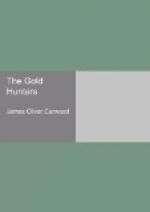“The wind is wrong, dead wrong,” said Wabi. “It’s blowing straight toward them. Unless we are so high that our scent goes above them they won’t come much nearer.”
Another minute and Rod nudged Wabigoon.
“They’re within range!”
“Yes, but we won’t shoot. We don’t need meat.”
As the young Indian spoke the cow brought herself to a dead stop so suddenly that Wabi gave a delighted grunt.
“Great!” he whispered. “She’s caught a whiff of us, a quarter of a mile away. See how she holds her head, her great ears chucked forward to hear, her nose half to the sky! She knows there’s danger on this mountain. Now—”
He did not finish. Like a flash the cow had darted ahead of her calf, seeming to shoulder it back, and in another moment the two were racing swiftly into the North, the mother this time in the rear instead of leading.
“I love moose,” said Wabi, his eyes glowing. “Do you notice that I never shoot them, Rod?”
“By George, so you don’t! I never thought of it. What is the reason?”
“There are a good many reasons. Of course I have shot them, when in very great need of meat; but it’s an unpleasant job for me. You call the lion the king of beasts. Well, he isn’t. The moose is monarch of them all. You saw how the mother moose acted. She led her calf when approaching, because if there should be danger she wanted to meet it first; and when she found danger she drove her calf ahead of her in retreat, so that if harm came to either of them it would come to her. Isn’t that the human mother instinct? And the bull is glorious! In the mating season he will face a dozen men in defense of his cow. If she falls first he will stand between her body and the hunters’ rifles, pawing the earth, his eyes glaring defiance, until he is riddled with bullets. Once I saw a wounded cow, and as she staggered away the big bull that was with her hugged her close behind, never for a moment leaving her exposed to the fire, but unflinchingly taking every bullet in his own body. So beautiful was his courage that you would not have known he was wounded until he fell dead in his tracks, literally cut to pieces. It was that sight that made me swear never to kill another moose—unless I had to.”
Rod was silent. The mother and the calf had disappeared when he turned to Wabigoon.
“I’m glad you told me that, Wabi,” he said. “You are teaching me new things about this big wilderness every day. I’ve shot one moose. I won’t shoot another unless we need him.”
They went back to their old camp, and by the time Mukoki returned with his second load everything was in shape for the night, and a supper of delicious bear steaks, coffee and “hot-stone biscuits,” as Rod called their baked combination of flour, water and salt, was soon ready. After their meal the three sat for a long time near the fire, for there was still a slight chill in the night air, and talked mostly about Wolf and his adventures. Rod, in his distant home in civilization had read and heard much that was false about wild animals, was confident that Wolf would find they had returned into the wilderness and would join them again, and to corroborate his belief he narrated several stories of similar happenings. Wabigoon listened courteously to him, which is the way of the Indian. Then he said:




